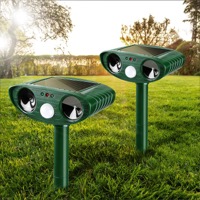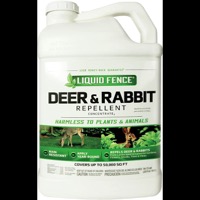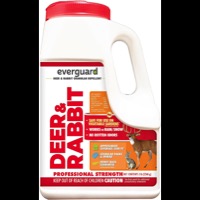Effective Rabbit Deterrents That Won't Harm Your Pets
Protect Your Garden and keep your pets safe
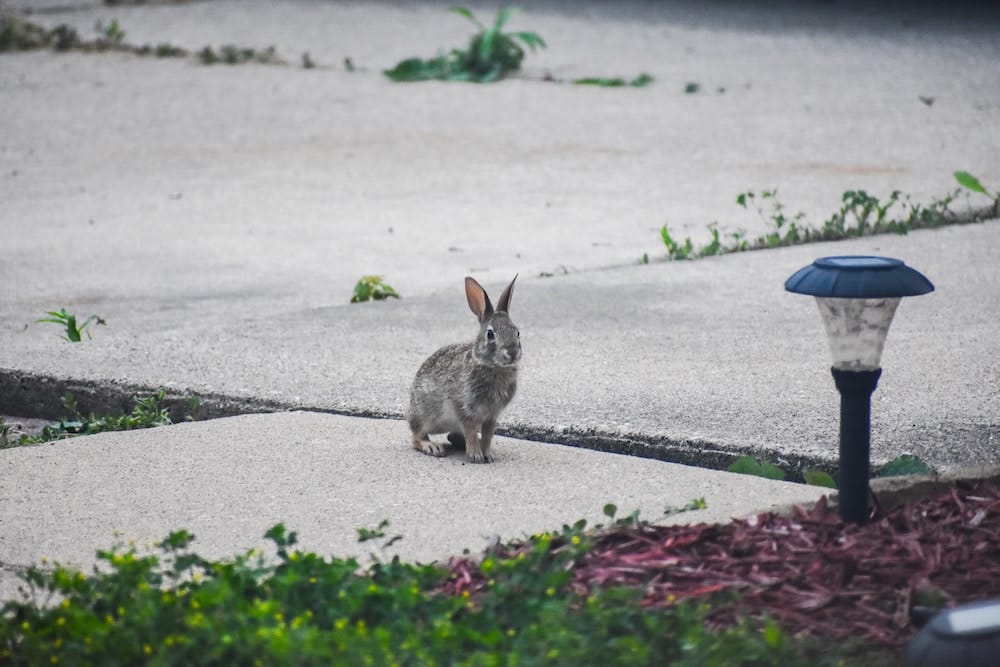
By Sigmund Daughty, Expert Reviewer for Repellent Guide
published: Aug 15, 2023 | updated: Aug 15, 2023
Introduction
Our pets are an integral part of our families, and their safety is paramount. When it comes to dealing with rabbit invasions in our gardens, we want to ensure that any deterrents used are pet-friendly. This article focuses on effective, non-harmful strategies to deter rabbits without posing a risk to our furry companions.
Understanding the Challenge
Rabbits are nimble creatures with voracious appetites for garden vegetation. When finding solutions to protect your green space, it's crucial to consider the safety of your pets. While many repellents effectively deter rabbits, they can also be harmful or irritating to domestic animals. Let's explore some pet-friendly options.
1. Fencing: A Physical Barrier to Keep Rabbits at Bay
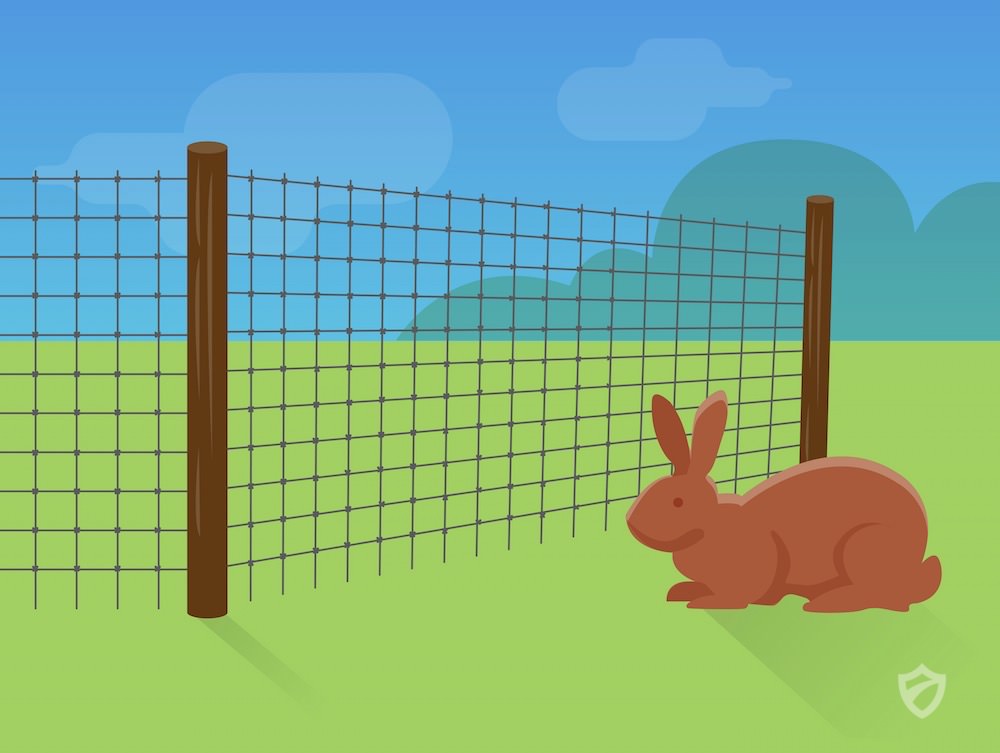
One of the most straightforward and effective solutions to rabbit invasions is to use fencing. It acts as a physical barrier, preventing these little intruders from feasting on your garden while keeping your pets safe.
To ensure effectiveness, the design of your fence is crucial. Rabbits are agile creatures known for their ability to squeeze through small spaces, dig burrows, and leap high. So, how can you design a rabbit-proof fence?
Mesh Size: Opt for a fence with a small mesh size. A 1-inch mesh is usually sufficient to prevent even the smallest rabbits from getting through. If you have young rabbits (kits) in your area, you might need to go even smaller.
Burrow-Proofing: Rabbits are proficient diggers. To prevent them from burrowing under your fence, extend it underground. Ideally, your fence should be buried 6-12 inches beneath the surface. For additional security, bend the bottom of the fence outward to create an L-shape, which will further deter digging.
Height: Don't underestimate a rabbit's ability to jump. To prevent them from leaping over your fence, it should be at least 2-3 feet high. If you have particularly athletic rabbits in your vicinity, you might need to go higher. Consider a fence with a loose top, as rabbits are less likely to climb over a fence if they can't get a secure grip.
Material: Choose durable, rust-resistant materials like PVC or galvanized wire. These materials will withstand weather conditions and ensure your fence remains effective for years to come.
Pet Safety: Fences are an excellent option for keeping rabbits out while ensuring the safety of your pets. The small mesh size that deters rabbits will also prevent your pets from sticking their heads or limbs through the fence and getting stuck.
Fencing your garden might involve some work initially, but once installed, it offers a long-term, maintenance-free solution to your rabbit problem. By ensuring that your fence is secure at all levels – above ground, at ground level, and underground – you can protect your garden from rabbits while maintaining a safe environment for your pets.
2. Raised Garden Beds and Planters: Putting Your Garden Out of Reach
Raised garden beds and planters offer an effective way to protect your vegetation from rabbits, while also adding an aesthetic touch to your outdoor space. Their elevated design puts your plants out of reach from these ground-based invaders.
Raised Garden Beds: Raised garden beds are an excellent option for vegetable gardens or larger planting areas. They are essentially large boxes, without bottoms, filled with soil and compost, allowing deep-rooted plants plenty of room to grow. Raised beds should be at least 2-3 feet high to deter rabbits from jumping in. If your beds are lower, consider adding a small fence or border around the top for additional protection.
Planters: For smaller plants or if you have limited space, planters are a practical alternative. They come in various sizes, styles, and materials, such as ceramic, wood, or plastic, allowing you to pick something that suits your garden's aesthetic. Ensure the planters are high enough to be out of reach of rabbits.
Advantages: Raised beds and planters provide multiple benefits beyond rabbit protection. They improve soil drainage, reduce back strain from bending over, and can help prevent other pests like slugs and snails. The soil in raised beds also warms up more quickly in spring, allowing you to plant earlier.
Pet-Friendly: Raised garden beds and planters are a safe choice if you have pets. They help to clearly define the "off-limits" areas for pets, reducing the chance of them trampling on your plants. However, ensure any plants you choose are non-toxic and safe if your pets decide to take a nibble.
Creating an elevated garden space might require an investment of time and resources, but it's a long-term, sustainable solution. Not only will it make your garden less appealing to rabbits, but it also makes gardening easier for you and safe for your pets. This approach is a win-win for everyone—except the rabbits, of course!
3. Ultrasonic Devices: Invisible and Inaudible Deterrents
Ultrasonic devices can be an innovative solution to deter rabbits from your garden. These devices work by emitting high-frequency sounds, typically between 20,000Hz and 60,000Hz, that are unpleasant to rabbits but are inaudible to most humans and pets. Here's a deeper dive into how ultrasonic devices work and how to use them effectively.
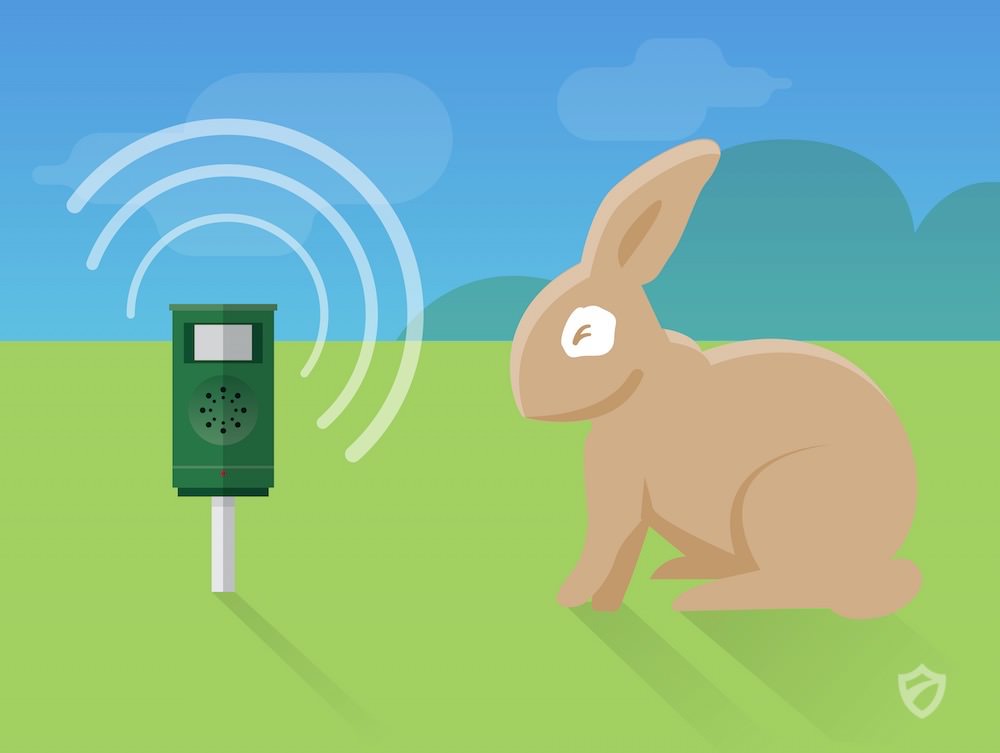
How Ultrasonic Devices Work
These devices operate on the principle of using sound as a deterrent. The high-frequency sounds they emit are disturbing to rabbits, making them uncomfortable and encouraging them to leave the area. However, because most pets, such as dogs and cats, have a hearing range similar to humans, they typically can't hear these sounds.
Effective Placement
For ultrasonic devices to work effectively, it's essential to place them correctly. They should be installed at a height that aligns with the rabbit's ear level for the sound waves to have the maximum impact. Positioning the device close to areas where you've seen rabbit activity can enhance its effectiveness.
Monitoring Your Pet's Behavior
While most pets aren't bothered by ultrasonic devices, sensitivity can vary between animals. Monitor your pets for any signs of distress or unusual behavior when you first install the device. If your pet seems bothered, discontinue use and consider other rabbit deterrent options.
Battery Life and Maintenance
Ultrasonic devices are usually battery-operated, although some models may be solar-powered. Make sure to check the battery life of the device and replace batteries as necessary to ensure it remains effective. Other than that, these devices typically require little maintenance.
Environmental Considerations
One of the significant advantages of ultrasonic devices is that they are a non-invasive, chemical-free method of deterring rabbits. They don't harm the environment or the rabbits themselves—they simply encourage them to find a different place to forage.
In conclusion, ultrasonic devices can be an effective, low-maintenance option for those seeking a safe and non-invasive way to deter rabbits from their gardens. As always, ensuring the safety and comfort of your pets is paramount, so monitor their behavior closely when introducing any new deterrent methods.
4. Natural Rabbit Repellents: Harnessing the Power of Scents
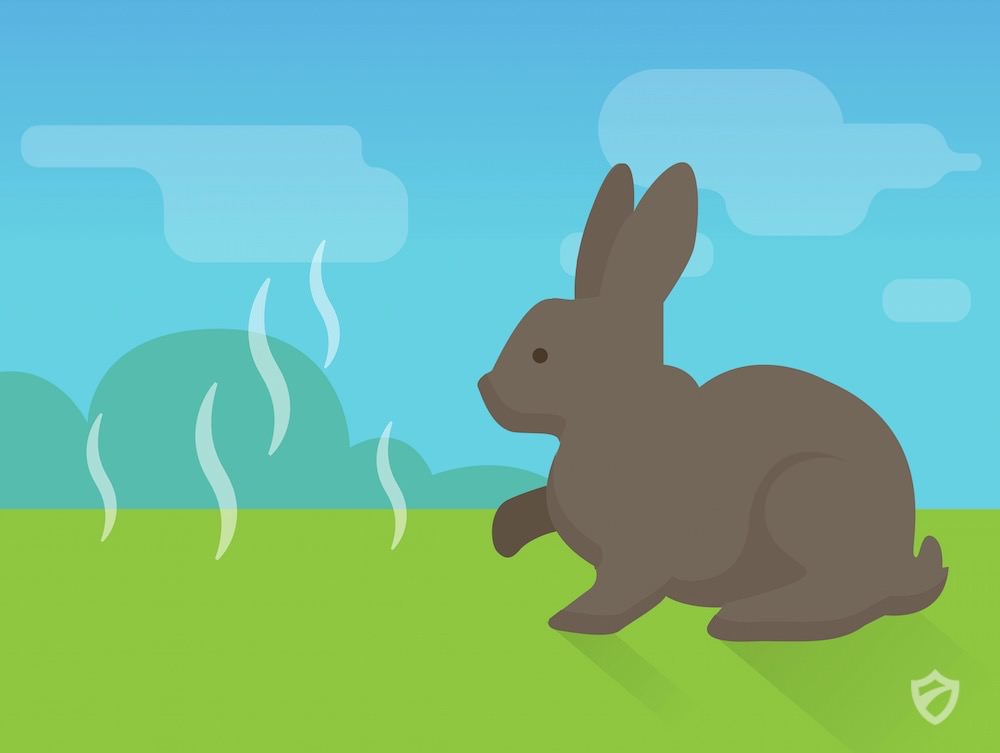
Using natural repellents can be an environmentally friendly and pet-safe way to keep rabbits at bay. Rabbits have a keen sense of smell and are particularly sensitive to certain odors. Here's an exploration of natural repellents that can help protect your garden from rabbits.
Spices and Herbs: Rabbits tend to dislike the smell of certain spices and herbs. Chili powder, garlic, and onions are often effective at deterring rabbits. Sprinkle these around the perimeter of your garden or mix them with water and spray them on your plants. Similarly, herbs like thyme, basil, and mint can act as natural deterrents when planted around your garden.
Predator Scents: Commercially available repellents often use the smell of predators to frighten away rabbits. These typically contain the urine scent of predators like foxes or coyotes. While these can be very effective, some pet owners have found that these scents can make their pets nervous or agitated. Always monitor your pet's behavior when using these types of repellents.
Homemade Repellents: You can create a homemade spray using a combination of vinegar, dish soap, and spices like cayenne pepper. This mix creates a scent and taste that rabbits dislike. Spray this mixture on the plants that rabbits seem to prefer. Be sure to reapply after rain.
Soap: Some people have found that rabbits dislike the smell of strongly-scented soaps. Placing bars of soap around the garden or hanging them from trees can help deter rabbits. It's best to use biodegradable soaps to minimize any negative environmental impact.
Plant Choices: Some plants naturally repel rabbits. Incorporating these into your garden can provide a dual function - adding beauty to your space and keeping rabbits out. Examples of rabbit-repellent plants include geraniums, marigolds, and foxgloves.
Remember, the effectiveness of natural repellents can vary and may require regular reapplication, especially after heavy rain. Always keep a close eye on your pets when first using these methods to ensure they don't have an adverse reaction. Natural repellents provide an opportunity to use Mother Nature's own tools to keep your garden rabbit-free without causing harm to these creatures or your pets.
5. Fencing: Physical Barriers for Maximum Protection
Implementing fencing around your garden is a more traditional, but highly effective, method to keep rabbits out. It's safe for pets, and when installed properly, can be one of the most reliable ways to protect your garden from rabbit invasions. Let's delve into the details of how you can use fencing as a rabbit deterrent.

Fence Materials: Fences can be made from a variety of materials, but to deter rabbits, it's best to use wire mesh or 'rabbit fencing'. These materials have small gaps that rabbits cannot squeeze through. Make sure the fencing material is sturdy enough to withstand the elements and any potential attempts by the rabbits to break through.
Fence Height: Rabbits are great jumpers, so your fence needs to be high enough to prevent them from leaping over. A height of around 2-3 feet is generally sufficient.
Fence Depth: Rabbits are also keen diggers, so it's important to bury the lower part of the fence to prevent them from burrowing underneath. You should bury at least 6-12 inches of the fence underground.
Gate Check: If your garden has a gate, make sure it fits snugly against the ground so rabbits can't squeeze underneath.
Fence Maintenance: Regularly inspect your fence for any signs of damage or weak spots. Rabbits will often take advantage of any break in the fence to sneak into your garden.
Adding Visual Appeal: Fences can be more than just functional - they can also be part of your garden's aesthetic. Consider painting your fence or decorating it with climbing plants. Just ensure the plants you choose aren't rabbit favorites!
Fencing requires an initial investment of time and resources but offers a long-term solution to rabbit problems. It’s an excellent way to secure your garden without using any potentially harmful substances, making it an ideal option for those with pets or who prefer organic gardening methods. With a well-constructed fence, you can keep your garden rabbit-free and ensure a safe environment for your pets.
6. Maintaining a Clean Garden: Discourage Rabbit Settlement
A key part of deterring rabbits is making your garden less attractive to them. By maintaining a clean and organized garden, you can discourage rabbits from settling in. Here's a look at how cleanliness and order can help keep your garden rabbit-free.
Trimming and Pruning: Regularly trim overgrown plants and prune lower branches of bushes and trees. Rabbits use these as cover to hide from predators. By minimizing their hiding spots, you make your garden less appealing.
Remove Food Sources: Keep your garden free from fallen fruit or vegetables. These can attract rabbits and other pests. Regularly harvest ripe fruits and vegetables and clean up any that fall to the ground.
Regular Mowing: Keep your lawn mowed. Long grass provides ideal cover for rabbits. A regularly mowed lawn is less inviting.
Secure Compost Bins: Make sure compost bins are securely covered. The smell of decomposing organic material can attract rabbits. Also, ensure the base of your compost bin is secure, as rabbits might try to burrow underneath to gain access.
Avoid Overfeeding Birds: If you have bird feeders, be mindful not to overfeed, as dropped seeds can attract rabbits. Try to use bird feeders that catch fallen seeds.
Garden Tools and Equipment: Store garden tools and equipment properly. Don't leave them lying around the garden, as they can provide cover for rabbits.
Remember, a clean and well-maintained garden is not just about aesthetics. It plays a vital role in pest control. By taking these steps, you can make your garden less inviting to rabbits, protect your plants, and ensure the safety and enjoyment of your garden for you and your pets. Prevention is always better than cure, so regular garden maintenance should be part of your strategy against rabbits.
7. Conclusion: Balancing Rabbit Control and Pet Safety
Protecting your garden from rabbits while keeping it safe for pets can be a challenging task, but it's definitely achievable. By combining different strategies, such as using pet-friendly repellents, installing a suitable fence, and maintaining a clean garden, you can effectively deter rabbits without causing harm to your pets.
Remember, it's important to monitor your pets' behavior when you first introduce any new deterrent or repellent. Some pets might be sensitive to certain smells or changes in their environment. If you notice any adverse reactions, it's best to try a different method or consult with your vet for advice.
In your quest to protect your garden, it's also important to remember that rabbits are a part of our natural ecosystem. The goal isn't to harm them, but to guide them elsewhere and protect our gardens in a non-harmful way. By being aware of the habits and preferences of rabbits, you can coexist peacefully with these adorable creatures while keeping your garden in top shape and your pets safe.
The challenge of rabbit control presents an opportunity to learn and apply our knowledge of natural deterrents and rabbit behavior. In doing so, we contribute to a more harmonious coexistence with wildlife, while ensuring that our beloved pets and gardens remain safe and thriving. Let’s continue to explore and share our learning experiences in order to make our world a better place for all its inhabitants.
-
Ultrasound
-
Concentrate
-
Granules

